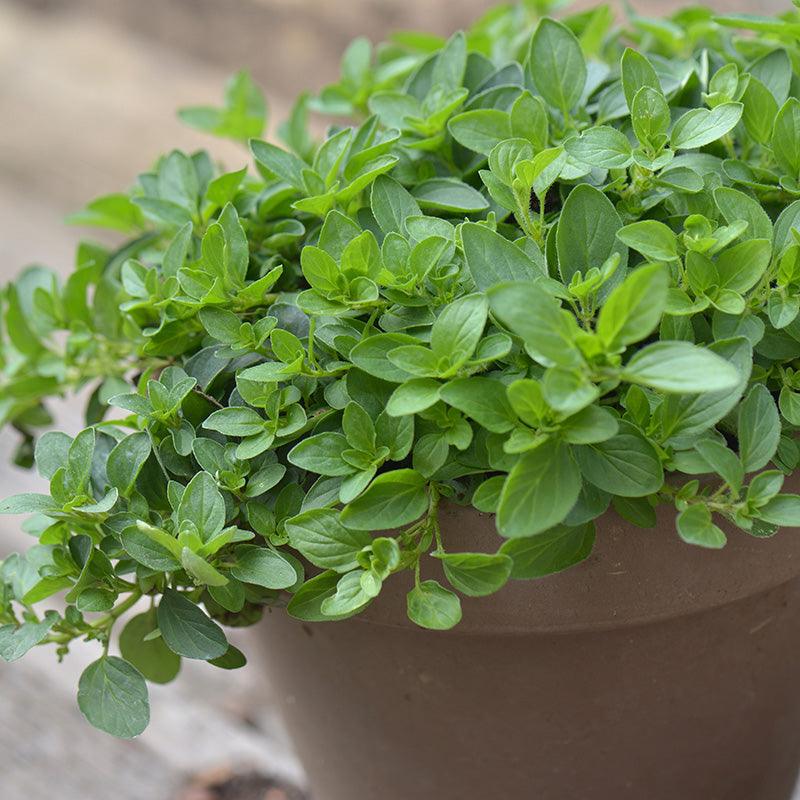Item Number: PV165
Organic Greek Oregano
Garden-to-Plate Excellence
Greek oregano, a robust perennial herb, boasts a spreading growth habit and enduring garden charm. Its resilient, dark green leaves are round with a distinctive gritty texture and light fuzz. In summer, it produces small white flowers typical of culinary oreganos. A staple in Mediterranean cuisine, Greek oregano enhances a wide range of dishes with its bold, aromatic flavor and thrives reliably in various growing conditions.
Sustainably grown in 2.75" pots
Choosing the Right Location
Greek oregano thrives in well-drained soil and needs plenty of sunlight—ideally 6 to 8 hours daily. Choose a planting location that ensures good drainage to prevent root rot, as this herb does not tolerate soggy conditions.
Looking to maximize space in your garden? Learn more about using oregano as a ground cover for both beauty and utility.
Preparing the Soil
Before planting, clear the area of weeds and debris. Improve soil fertility and drainage by incorporating organic matter like compost or aged manure. Greek oregano prefers slightly alkaline soil with a pH of 6.0 to 8.0.
Planting Greek Oregano
Plant starts in well-prepared soil, spaced 12 to 18 inches apart to allow for good air circulation and healthy growth.
Watering and Maintenance
Once established, Greek oregano is low-maintenance. Water deeply but infrequently, allowing the soil to dry between waterings. Avoid overhead watering to prevent disease. Pinch back stems periodically during the growing season to promote bushiness and remove any dead or yellowing leaves to support plant health.
Fertilizing
This herb does not require heavy feeding. Apply a balanced, slow-release fertilizer once or twice per growing season or top-dress with compost to maintain nutrient-rich soil.
Harvesting Greek Oregano
Begin harvesting once plants are 4 to 6 inches tall. Snip individual leaves or entire stems as needed. Morning harvests yield the most flavorful leaves, thanks to concentrated essential oils. Use fresh, or dry by hanging stems upside down in a warm, ventilated area.
Pest and Disease Management
Greek oregano is naturally pest- and disease-resistant. Occasionally, aphids, spider mites, or whiteflies may appear—treat with neem oil or insecticidal soap. Ensure proper spacing and avoid overhead watering to prevent fungal issues like powdery mildew.
Overwintering Greek Oregano
Hardy in USDA zones 5–9, Greek oregano can survive mild winters. In colder climates, protect plants with mulch or grow them in containers to bring indoors during the cold months. For more detailed guidance, check out our article on overwintering oregano in cold climates.
Attracting Pollinators
Greek oregano not only flavors your food—it also benefits your garden's ecosystem. Its small white flowers are attractive to pollinators like bees and butterflies. Learn more about growing oregano in pollinator gardens to support biodiversity and a healthy environment.
Looking for more oregano varieties?
Browse our full selection of oregano seeds here and explore other delicious and aromatic types to grow in your garden.




Check Your Zone Compatibility:
Compatible with your zone.
Growing Zone for

Our Guarantee To You
Since 1976, we've served our customers at every stage of growing. Please contact us at any time. We are happy to support and assist you.
Shipping Information
Shipping Information
Cannot ship to the following states: AK, HI, PR, VI, GU
Shipping Weight: 0.5 lb
Features
Features
- Container Compatible
- Does Not Require Support
- Edible Flower
- Good for Drying
- Heirloom
- Open-Pollinated
- Requires Summer Water
- Somewhat Drought Tolerant
Characteristics
Characteristics
Planting & Care
Planting & Care
Soil and Water: Oregano prefers light, well-drained, moderately fertile soil with a neutral ph. Water regularly, but moderately.
Planting and Growing: Plant starts in late spring or early summer, once the soil has warmed up to at least 60°F (21°C). Space plants 2 feet apart. Pinch during early growth to establish a bushier habit.
Harvesting & Storage: Harvest leaves as desired. Leaves retain flavor well when dried; dry away from sun to preserve color and flavor. Store in an airtight container.
Useful Information
Useful Information
Guarantee
Guarantee
We guarantee the perishable items we sell to be in good, viable condition when we sell them. Perishable items include, but are not limited to, garlic bulbs, flower bulbs, seed potatoes, onion sets & transplants, potted or bare root trees, vegetable crowns, etc. If your perishable item arrives in substandard condition, take photographs and please contact us within 3 days of the purchase date (or delivery date) and we will provide you with a refund of the purchase price (excluding shipping costs), or a replacement. Accordingly, we urge you to open any boxes marked as ""Perishable"" immediately upon receiving them and inspect the shipment thoroughly (do not crack open heads of garlic, we do not accept claims on cracked garlic). Because some perishable items can deteriorate very quickly, we cannot accept any claims beyond the 3-day time frame as it becomes too difficult to determine if these items were delivered in substandard condition, or if they turned into such substandard condition because of having been improperly cared for or stored once delivered.
Share


